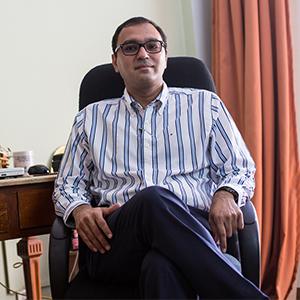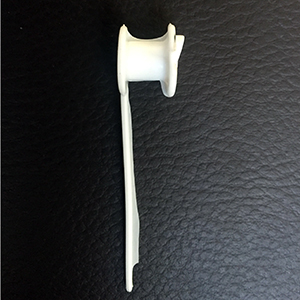
Head and neck cancer specialist Dr. Vishal Rao has recently invented the Aum Voice Prosthesis is to help throat cancer patients speak and eat properly after surgery. The device, especially pioneered for the poor, costs only INR 50 (<1 USD). An interview with Dr. Vishal Rao:
Tell us about your brain child – Aum?
The realization of not being able to speak, first dawned on me, when I had a throat cancer patient from a village visit my clinic. He had already been operated and his voice box removed. His main grievance was, ‘Doctor, how can I speak again? I cannot afford the voice prosthesis. It is very costly’.
Just then my friend, Shashank Mahes, an industrialist and co-inventor of this prosthesis, walked into the room. When I asked him to raise donations for the villager, he emphatically said: “Why donations? Why don't you develop the voice prosthesis yourself? I’ll give you the industrial expertise and you give me the technical. Let’s go out and make a difference to these poor patients.” That’s how it all started.
In India, the main cause of throat cancer is due to smoking beedi or cigarettes. Majority of the patients belong to the poor class and detect the disease in the advanced stages, when organ preservation is not possible. They end up losing their voice box. But because they are poor, they find it difficult to afford voice prosthesis after removal of the voice box.
How unique is your device compared to others available in the market?
At present, similar products in the market are imported and available for Rs. 15,000 -- Rs 35,000. What makes this product unique is the intent behind it. It was our vision that “even the poorest of the poor deserved the right to communicate”. We always thought why give inferior quality products to poor just because they cannot afford, they deserve the best. Hence, we have priced it at only Rs 50. This is what makes Aum a unique product.
How did you manage this incredulously low price?
Our intent in this device was to reach out to needy at the most uncorrupted costs. Thus there was a need to blend the best standards with functionality and affordability. This was feasible only because we did not charge for our time and talent; nor did several of the manufacturers, suppliers, engineers, physicists and technical experts who understood the intent of this product. We all created a demarcation between necessity of life and privileges.

You have named your device ‘Aum’ Voice Prosthetics? What is the significance of it?
The word AUM signifies the primeval sound of creation. ‘A’ signifying Creation, ‘U’ signifying Sustenance and ‘M’ signifies Annihilation. This is not a religious connotation, but signifies 3 defining principles of this universe.
When these patients lose their voice box, they cannot speak again. Our prosthesis gives them a rebirth into the world of communication which resonates and resounds all these aspects of creation. This prosthesis should come as a thanks giving to the almighty and help them serve and pay it forward to the needy.
Could you tell us how the Aum device helps throat cancer patients?
Prosthesis is an artificial device that replaces a missing body part lost through trauma, disease, or congenital conditions. Voice prosthesis is an artificial device, made of silicone that is used to help laryngectomized patients to speak.
Our device, the Aum Voice Prosthesis, helps throat cancer patients whose voice box is removed to speak again.
Has it been implanted into any patients so far? And for how long?
We have implanted it in 3 patients till date. We have initiated the clinical study for 30 patients presently. It usually is said to have a life of 6 months. However, some Indian studies show that similar devices can last for up to 2 yrs.
What are the side-effects of the implant? Does a patient need speech therapy post-implantation and for how long?
Side effects are very few with these devices as it is made up to of medical grade platinum cured silicon. Generally many patients speak immediately with physician assisted training. We however encourage patients to meet the speech therapist to improve speech quality.
Where can one avail of this device?
At present, it is under manufacture and should be available in a month to our patients.
Who all were involved in making Aum a reality?
To start with, it was Shashank and I. But this would not have been possible without the support and guidance of his team of engineers, technicians and support staff who constantly made us think, re-think and modify the prosthesis to perfection. Above all, this team was spearheaded by the guidance of the divine Lord who gave us the spirit, motivation and perseverance to make this into a success.
What are your future plans for Aum Voice prosthesis?
We hope to first reach out to all the regional cancer centres. We have now filed patents for this device and also received scientific and ethical approval to start using this prosthesis on our patients and conduct a study. We plan to initiate a country wide study involving several interested centres to use the prosthesis and give us a feedback on its functionality. This would help us to improvise it better.
Dr Rao, you are a successful Oncologist and a Head and Neck Surgeon, tell us a little about your formative years in the profession.
I did my medical school and post graduation from JNMC Belgaum. My training in oncology was at Tata Memorial Hospital in Mumbai at the department of head neck surgical oncology. Following this, I did a brief stint as a visiting scholar at University of Pittsburgh and returned to India. I joined the regional cancer centre - Kidwai Memorial Institute of Oncology where I worked as assistant professor for a period of around 2 years. Presently, I'm with HCG - HealthCare Global Cancer Centre at Bangalore as Incharge of Head Neck Services.
What is the inspiration behind becoming an innovator? How did you get into the field of research?
I fondly recollect the words of Sri Sathya Sai Baba who said “The end goal of education is knowledge and end goal of knowledge is service”. His super specialty hospital in Puttaparthi where I volunteered inspired me immensely. It was the only centre without a filing counter. I saw the finest spirit of service in hospitals and in their operating rooms. This is I must say was the most inspiring event that made me think of innovating simple devices that would largely help us reach out to our patients. Besides this, my teachers, my parents and my wife and son continue to inspire me.
From the beginning, I've always been interested in the field of research and publications. We cannot progress without innovations or research. Even our work can become monotonous without research. It was Dr Anil D’cruz, Director of Tata Memorial Hospital, who stimulated, motivated and inspired me to pursue research and sustain my academic zeal.
What is your message for upcoming doctors?
Once again I would like to use the words of Sri Sathya Sai Baba - “A Healthy society should have less doctors, less hospitals and less illness” that is goal of health. We need to reinstate the respect and faith of patients had in doctors thorough 3 Cs - improved Concern, effective Communication and eliminating Commercialisation.
Lastly, dare to dream and then be wise to wake up and work hard.
Dr. Vishal Rao is Incharge of Head Neck Services at HCG - HealthCare Global Cancer Centre, Bangalore






